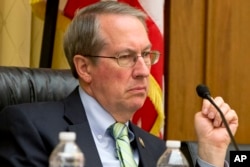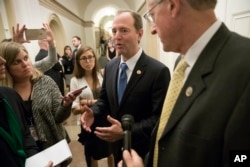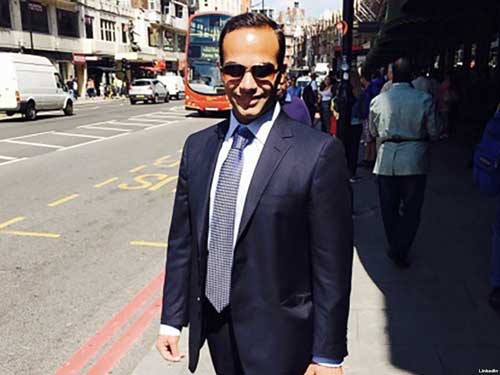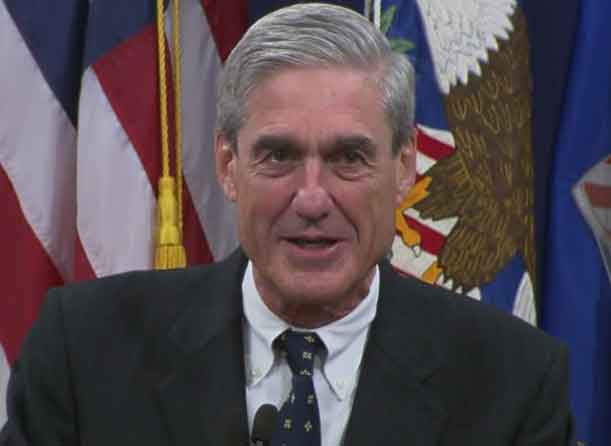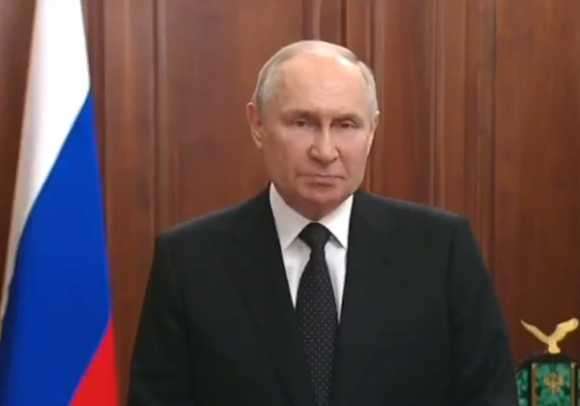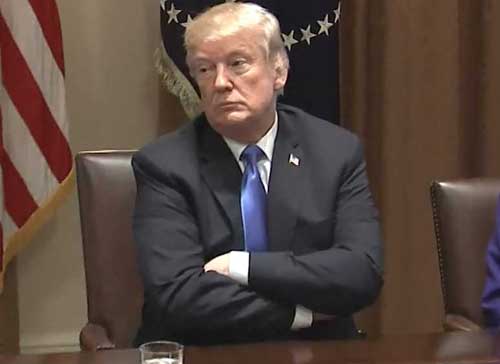
U.S. Attorney General Jeff Sessions on Tuesday rejected accusations that he had lied to lawmakers when he previously testified he knew of no contacts Donald Trump’s election campaign had last year with Russian operatives.
Sessions told the House Judiciary Committee he had no recollection of a 2016 meeting with Trump campaign aide George Papadopoulos, who discussed his contacts with people who said they could arrange a meeting between Trump and Russian President Vladimir Putin, until recent news reports showed he had chaired the meeting.
“In all of my testimony, I can only do my best to answer all of your questions as I understand them and to the best of my memory,” Sessions said. “But I will not accept and reject accusations that I have ever lied under oath. That is a lie.”
Since his last appearance before a congressional panel in mid-October, news surfaced that Papadopoulos had pleaded guilty in early October to lying to federal agents investigating Trump campaign links to Russia and is cooperating with special counsel Robert Mueller’s criminal investigation.
Prosecutors said in court records that at a March 2016 meeting, about seven months before the presidential election, Papadopoulos told Sessions, Trump and others that he had connections that could arrange the Trump-Putin meeting. Sessions said he “pushed back” against Papadopoulos’s idea and the Trump-Putin meeting never occurred in the midst of the campaign.
At his January confirmation hearing to become attorney general, the top U.S. law enforcement position, Sessions said he was unaware of communications between the campaign and Russia, but later acknowledged he himself had met then Russia’s then-ambassador to Washington, Sergei Kislyak.
Sessions attributed his failure to remember the Papadopoulos meeting, as well as a contact with Carter Page, another Trump aide who was making overtures to Russia, to the chaos of the Trump campaign.
“It was a brilliant campaign in many ways,” Sessions said. “But it was a form of chaos every day from day one. We traveled all the time, sometimes to several places in one day. Sleep was in short supply.”
One Sessions critic, Democratic Senator Al Franken of Minnesota, told the Senate on Monday, “Attorney General Sessions has misrepresented the truth … time and time again.”
Sessions also defended his directive for senior federal prosecutors to examine issues raised by Republican lawmakers connected to Trump’s election challenger, Democrat Hillary Clinton.[xyz-ihs snippet=”adsense-body-ad”]So far, however, Sessions has declined to appoint a new special counsel to examine the Republican claims related to Clinton. He told the committee that it “looks like” there “is not enough basis to appoint a special counsel.”
He said if there are any new probes, they would be conducted “without political influence. They will be done properly.”
Committee chairman Rep. Robert Goodlatte asked Sessions in July and September to appoint a special counsel to investigate allegations of collusion between Clinton’s campaign and the Democratic National Committee, issues linked to her use of a private email system while serving as secretary of state, contributions to her family’s Clinton Foundation, and an Obama-era purchase of American uranium mines by a Russian-backed company.
The letter also asked for an examination of certain aspects of the Federal Bureau of Investigation’s probe into Russian meddling in the 2016 election.
Assistant Attorney General Stephen Boyd responded in a letter to Goodlatte on Monday that prosecutors would report directly to Sessions and Deputy Attorney General Rod Rosenstein “as appropriate” and recommend whether any investigations should be opened or expanded. He further pledged the Justice Department “will never evaluate any matter except on the facts and the law.”
Trump, as president, has regularly attacked Mueller’s investigation of Russia’s role in the election and possible collusion with the Trump campaign, as well as congressional probes. U.S. intelligence agencies concluded in a January report that Putin directed an effort to help Trump’s chances of winning and undermine American democracy.
Since his last appearance before a congressional panel in mid-October, news surfaced that Papadopoulos had pleaded guilty in early October to lying to federal agents investigating Trump campaign links to Russia and is cooperating with special counsel Robert Mueller’s criminal investigation.
Prosecutors said in court records that at a March 2016 meeting, about seven months before the presidential election, Papadopoulos told Sessions, Trump and others that he had connections that could arrange the Trump-Putin meeting. Sessions said he “pushed back” against Papadopoulos’s idea and the Trump-Putin meeting never occurred in the midst of the campaign.
At his January confirmation hearing to become attorney general, the top U.S. law enforcement position, Sessions said he was unaware of communications between the campaign and Russia, but later acknowledged he himself had met then Russia’s then-ambassador to Washington, Sergei Kislyak.
“It was a brilliant campaign in many ways,” Sessions said. “But it was a form of chaos every day from day one. We traveled all the time, sometimes to several places in one day. Sleep was in short supply.”
One Sessions critic, Democratic Senator Al Franken of Minnesota, told the Senate on Monday, “Attorney General Sessions has misrepresented the truth … time and time again.”
Sessions also defended his directive for senior federal prosecutors to examine issues raised by Republican lawmakers connected to Trump’s election challenger, Democrat Hillary Clinton.
So far, however, Sessions has declined to appoint a new special counsel to examine the Republican claims related to Clinton. He told the committee that it “looks like” there “is not enough basis to appoint a special counsel.”
He said if there are any new probes, they would be conducted “without political influence. They will be done properly.”
Committee chairman Rep. Robert Goodlatte asked Sessions in July and September to appoint a special counsel to investigate allegations of collusion between Clinton’s campaign and the Democratic National Committee, issues linked to her use of a private email system while serving as secretary of state, contributions to her family’s Clinton Foundation, and an Obama-era purchase of American uranium mines by a Russian-backed company.
The letter also asked for an examination of certain aspects of the Federal Bureau of Investigation’s probe into Russian meddling in the 2016 election.
Assistant Attorney General Stephen Boyd responded in a letter to Goodlatte on Monday that prosecutors would report directly to Sessions and Deputy Attorney General Rod Rosenstein “as appropriate” and recommend whether any investigations should be opened or expanded. He further pledged the Justice Department “will never evaluate any matter except on the facts and the law.”
Trump, as president, has regularly attacked Mueller’s investigation of Russia’s role in the election and possible collusion with the Trump campaign, as well as congressional probes. U.S. intelligence agencies concluded in a January report that Putin directed an effort to help Trump’s chances of winning and undermine American democracy.
Trump has repeatedly called for more law enforcement scrutiny of Clinton.
“Everybody is asking why the Justice Department (and FBI) isn’t looking into all of the dishonesty going on with Crooked Hillary & the Dems…” Trump tweeted last month.
The president’s comments and the move by Sessions to consider appointment of a new special prosecutor brought complaints from Democrats about executive interference with the judicial branch.
“If the AG bends to pressure from President Trump and his allies, and appoints a special counsel to investigate Trump’s vanquished rival, it could spell the end of the DOJ as an independent institution,” Rep. Adam Schiff said on Twitter.
Rep. Gregory Meeks said the attorney general’s actions were a “political smokescreen” meant to distract from collusion between the Trump campaign and Russia.
“The President & Sessions just politicized the Dept. of Justice, trampling on this country’s sacred rule of law,” Meeks tweeted.
Rep. Andy Biggs, who was one of the Republicans who signed onto Goodlatte’s letter, said the Justice Department’s response is “encouraging,” but not as decisive as the lawmakers would have liked.
“We must have an unbiased, independent special counsel to investigate the matters we have raised. We have spent long enough on meaningless evaluations and empty promises,” Biggs said in a statement.
Related
-

Key Moments of Sessions’ Congressional Testimony
-

US Justice Department Considering Probes of Republican Concerns
-

New Russia Probe Details Likely to Dominate Sessions Hearing
More US Stories
-

UPDATE At Least 5 Killed in Shooting Near California Elementary School
-

Cambodian Strongman’s Trump Outreach Falls Flat
-
Serbian Court Suspends Sentences in US Embassy Attack Case
-
Key Moments of Sessions’ Congressional Testimony
-
Before High-Level Discussions, US Aims to Strengthen Ties to Africa
Featured Video
-

Survey: New Delhi Among the Most Dangerous Cities for Women
-

Hoboken, New Jersey Elects First Sikh Mayor
-

Memories of Raqqa
You may also like
-
 USA
USAOn Russia Meddling in US Election, Where Do Trump and US Intel Community Stand?
-
 SILICON VALLEY & TECHNOLOGY
SILICON VALLEY & TECHNOLOGYStudents Fight Digital Robots and Fake Accounts on Twitter
-
 AFRICA
AFRICAUN Group Recommends Dropping Inquiry into Eritrea’s Ties to Al-Shabab
Trump has repeatedly called for more law enforcement scrutiny of Clinton.
“Everybody is asking why the Justice Department (and FBI) isn’t looking into all of the dishonesty going on with Crooked Hillary & the Dems…” Trump tweeted last month.
The president’s comments and the move by Sessions to consider appointment of a new special prosecutor brought complaints from Democrats about executive interference with the judicial branch.
“If the AG bends to pressure from President Trump and his allies, and appoints a special counsel to investigate Trump’s vanquished rival, it could spell the end of the DOJ as an independent institution,” Rep. Adam Schiff said on Twitter.
Rep. Gregory Meeks said the attorney general’s actions were a “political smokescreen” meant to distract from collusion between the Trump campaign and Russia.
“The President & Sessions just politicized the Dept. of Justice, trampling on this country’s sacred rule of law,” Meeks tweeted.
Rep. Andy Biggs, who was one of the Republicans who signed onto Goodlatte’s letter, said the Justice Department’s response is “encouraging,” but not as decisive as the lawmakers would have liked.
“We must have an unbiased, independent special counsel to investigate the matters we have raised. We have spent long enough on meaningless evaluations and empty promises,” Biggs said in a statement.
Source: VOA

